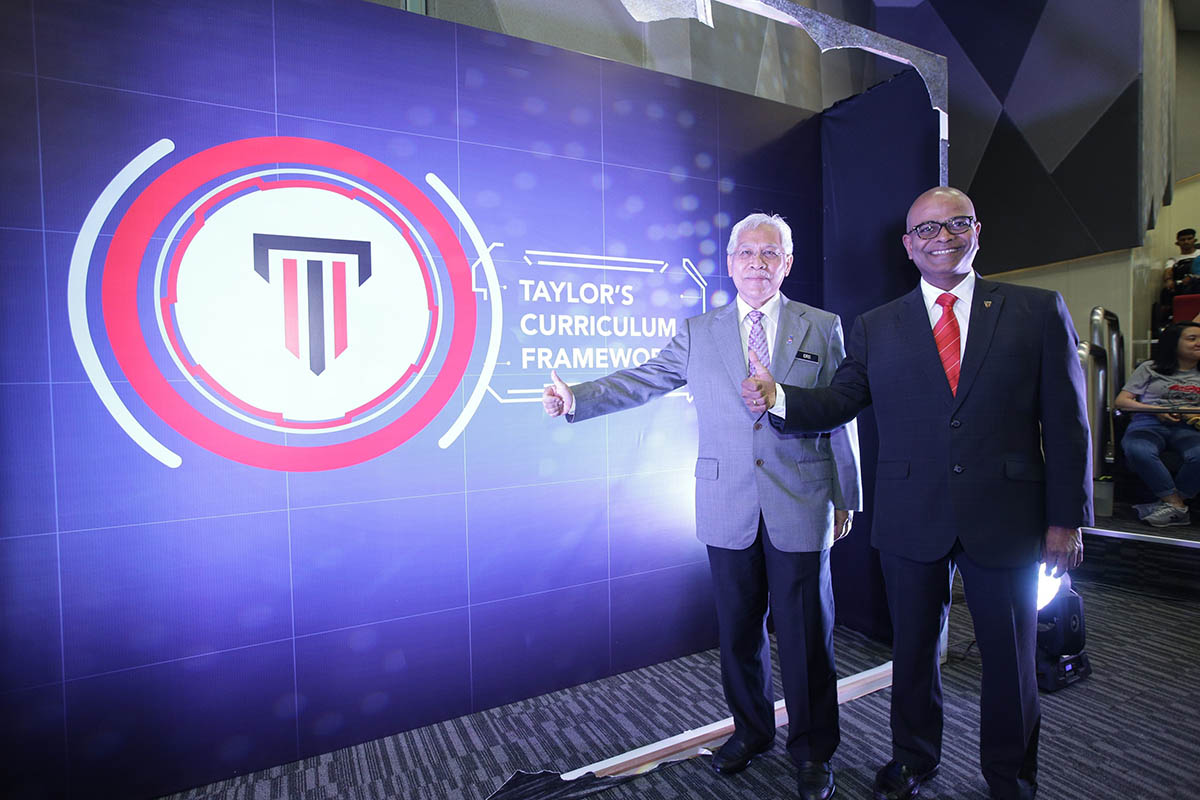Taylor’s University is embracing the future with the transformation of its curriculum for degree and diploma programmes beginning March 2018. The Taylor’s Curriculum Framework (TCF) is an overhaul of the traditional curriculum and is crafted to enable students to be future-ready. With the enhancement of the curriculum, Taylor’s students will be equipped with in-demand skills that will stand the test of time in an ever-transforming global workplace.
"The Taylor’s Curriculum Framework aims to address the expected mismatch between tertiary education and the future job market in the Fourth Industrial Revolution (Industry 4.0). Employers and industry players are indicating that graduating with high marks does not necessarily equate to satisfactory performance in the workplace. Hence, we have redesigned our curriculum in order for our graduates to be future-proof and industry-relevant. With TCF, we are moving away from the rigid curriculum structure to a flexible, broad-based curriculum in order to develop high quality and resilient graduates. This effort could not have been undertaken without the support we received from the Minister of Higher Education Malaysia, Dato’ Seri Idris bin Jusoh; officials from the Ministry of Higher Education and officials from the Malaysian Qualifications Agency," said Taylor’s University Deputy Vice Chancellor and Chief Academic Officer, Professor Dr Pradeep Nair.
The Taylor’s Curriculum Framework launch was launched by the Minister of Higher Education Malaysia, Dato’ Seri Idris bin Jusoh at Taylor’s Lakeside Campus.

Taylor's Curriculum Framework is also in line with the Higher Education Mandate 2018 focus on higher education that is centred on the Fourth Industrial Revolution (Industry 4.0). According to the Mandate, university curriculum should be fluid and organic in order to prepare graduates for jobs which have yet to exist. Through its implementation, TCF will prepare students to respond to innovation and new areas of knowledge to stay abreast with transformations in industries.
"Higher education institutions must be able to position themselves in line with the changes brought about by Industry 4.0. I am pleased to see Taylor’s University take the lead in implementing the Taylor’s Curriculum Framework to future-proof our graduates. It is indeed a step in the right direction as the university provides students the needed 21 st century skills and exposure through a broad-based curriculum. At the same time, I believe TCF will empower students to take ownership through the curation of their degree and be committed in pursuing their ambition with the new framework," said Dato’ Seri Idris Bin Jusoh.
TCF offers students options for interdisciplinary modules that cater to their interests, strengths, and career ambitions while delivering a broader perspective outside their academic major. Students can co-curate their degrees by selecting from a list of 53 minors, 21 extensions, 21 second majors and 203 additional electives which are complementary to their primary major. The Complementary Study Component is a flexible, adaptive learning approach meant to equip graduates with the relevant skills for their future career.
Professor Pradeep shared that the approach to make education at Taylor's University broad-based and flexible will allow students develop both sides of their brain and become a holistic person.
"Industry 4.0 requires for a versatile, trans-disciplinary approach to education that will not box an individual into one particular degree. In order to take students beyond their primary discipline, the customisation of degrees offers students a myriad of options to mix and match their modules. For instance, a class of 30 Business students will now comprise of students enrolled in Business with Marketing, Business with Psychology or Business with IT. Our goal is to broaden their minds to other domains of knowledge and think in a transdisciplinary manner,” explained Professor Pradeep.
For students who wish to take on subjects beyond the offering of Taylor's University, TCF will allow them the platform to expand their knowledge while enhancing their cross-cultural knowledge by spending a semester abroad through mobility opportunities. Students can select from a list of 172 partner universities in 32 countries to gain relevant international experience and become more culturally adaptive. This includes the University of Sheffield in the United Kingdom; the University of Denmark and the University of Toulouse Jean Jaures in Europe as well as the Education University of Hong Kong; Toyo University in Japan and the University of South Australia, to name a few of the top universities that Taylor’s partners with.
"To survive the 21 st century and beyond, students need a variety of skills from what used to be taught in conventional degree programmes. The future graduate may likely retire having occupied multiple jobs across sectors, borders and cultures. Therefore, TCF serves to equip graduates with 21 st century-relevant skills such as entrepreneurialism, social intelligence, lifelong learning, communication skills, critical thinking, creativity, problem-solving, and the exposure to international cultures. These human-centred characteristics will take precedence over task-based characteristics when man and machine come together in the near future," said Professor Pradeep.
In addition to a co-curated degree structure, TCF includes two specially designed modules to strengthen students’ life skills and emotional well-being. The modules will guide students through the process of self-discovery to develop their personal and professional goals as well as teach the importance of teamwork, relationship management, stress management, effective communication, and critical thinking skills.
"We believe that TCF will impact students positively because they will feel responsible for their choice of modules and display increased level of commitment. Additionally, we will treat students' education independent of time; meaning they can graduate later than the standard three years, if they so wish to. We want to allow our students to truly take hold of their future and plan according to their career goals and strengths,” added Professor Pradeep.
